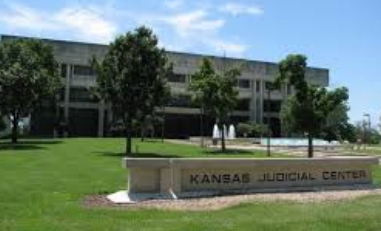
TOPEKA—Chief Justice Marla Luckert Friday evening issued six new administrative orders to provide updated direction to state courts and court users as the state slowly reopens following a plan outlined by the governor Thursday evening.
“These orders continue some of the strategies put in place at the beginning of this pandemic response and provide updated guidance for gradually reopening state courts, according to the framework announced by Governor Kelly,” said Chief Justice Luckert. “This approach reflects our commitment to protecting public health, and the health of our employees and judicial officers, while we increase the number and types of service we are able to deliver to the people of Kansas.”
Administrative Order 2020-PR-044: Reissuing Administrative Order 2020-PR-36 under Governor’s April 30, 2020, State of Disaster Emergency Declaration
This order suspends deadlines, time standards, and other applicable speedy trial provisions in municipal courts that have been closed by the COVID-19 pandemic and establishes that they will remain suspended until the court reopens and can reasonably place cases on its calendar or until further order. It also authorizes using two-way telephonic or electronic audio-visual communication in court proceedings to the extent they are permitted by the United States and Kansas Constitutions.
Administrative Order 2020-PR-045: Authorizing Two-Way Audio-Visual Communication in Any CourtProceeding
In this order, the chief justice authorizes courts to use two-way audio-visual communication to replace in-person judicial proceedings to protect the health and safety of court users, staff, and judicial officers.
The remote proceeding must be consistent with the United States and Kansas Constitutions, allow for confidential communication between counsel and a party or witness, and be reviewable by the public contemporaneously or soon after.
Administrative Order 2020-PR-046: Suspending Deadlines and Time Limitations Under K.S.A. 2019 Supp. 22-3402
In this order, the chief justice suspends deadlines and time limitations to bring defendants to trial under authority granted her by House Substitute for Senate Bill 102, which took effect on its March 19, 2020, publication in the Kansas Register.
Administrative Order 2020-PR-047: Suspending Deadlines and Time Limitations in Judicial Proceedings
In this order, the chief justice suspends statutes of limitations and statutory time standards regarding the conduct or processing of judicial proceedings under authority granted her by House Substitute for Senate Bill 102, which became law March 19.
The order allows for a district or appellate judge, or hearing officer, to exempt a case from the suspension of a statutory or other deadline, as long as it does not involve a matter covered by the governor’s Executive Order 20-10, which temporarily prohibits certain foreclosures and evictions.
Administrative Order 2020-PR-048: Order Relating to District Court Operations in Counties Not Affected by a Stay-at-Home Order or Subject to a Directive Closing a County Courthouse or Other Judicial Office
This order applies to court operations in cities and counties in which no local stay-at-home order is in place now or after such a stay-at-home order is lifted.
It directs the chief judge of the judicial district to work with the local public health official to verify that all appropriate measures are taken to protect the health and safety of the public, court users, court staff, and judicial officers. It also includes instructions for staffing the court.
Administrative Order 2020-PR-049: Relating to District Court Operations in Counties Affected by a Stay-at-Home Order or Subject to a Directive Closing a County Courthouse or Other Judicial Office
This order acknowledges that county officials, in response to local public health conditions, may impose more stringent restrictions than those issued by the governor and that these restrictions may affect courthouses, judicial officers, and court staff. Should that occur, the court covered by a local public health order will continue to perform essential functions as outlined. Nonessential functions may also be performed as resources and circumstances allow.
Essential functions
State courts have been operating in a limited capacity since March 18 under earlier Supreme Court orders issued in response to the COVID-19 pandemic. Courts initially were restricted to only essential functions, but they were later permitted to perform additional functions, to the extent local resources and circumstances allowed.
Essential functions generally include:
- determining probable cause for persons arrested without a warrant;
- first appearances;
- bond hearings;
- warrants for adults and juveniles;
- juvenile detention hearings;
- care and treatment emergency orders;
- protection from abuse and protection from stalking temporary orders;
- child in need of care hearings and orders;
- commitment of sexually violent predators; and
- isolation and quarantine hearings and orders.
Many courts, including the Supreme Court, have been carrying out their duties through remote hearings involving videoconferencing technology.
For a complete list of judicial branch actions to limit the spread of the novel coronavirus, visit Kansas Courts Response to COVID-19.
News Release



